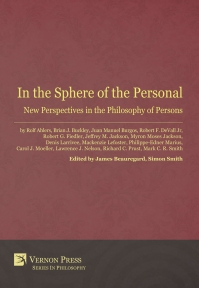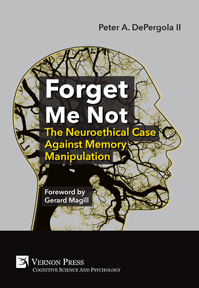Philosophical Neuroethics: A Personalist Approach. Volume 1
Foundations
by James Beauregard (Rivier University)
Purchase this book
(click here to change currency)
'Philosophical Neuroethics: A Personalist Approach' is an essential and interesting book. It deals with a topic that is in the center of attention of the contemporary scientific community but at the same time raises many questions in humanities. James Beauregard presenting neuroethics in the light of philosophy helps us to understand that this theme concerns the whole human being and not only part of it (i.e., brain, neurons, and neural systems). He points out that neuroethics is about the human person and an adequate grasp of the latter may lead us to understand the proper role of the former. In the book, the author tries to reconcile sciences and humanities, at least to a limited extent. By doing that he saves from a continually expanding gap between what sciences informs us about and what we know about ourselves from thinking and deliberation. Looking from the other side, Beauregard’s book makes us realize that the philosophy of the human person is very promising and may offer us new perspectives when it is conducted in a close relationship with exact sciences. 'Philosophical Neuroethics: A Personalist Approach' broadens our perception of who we are, and hence I highly recommend it.
Grzegorz Holub
Professor of Philosophy, The Pontifical University of John Paul II, Cracow, Poland
James Beauregard’s book "Philosophical Neuroethics" offers a refreshing and original perspective on contemporary neuroethics. Arguing that the empiricist philosophy and consequentialist ethics which form the basis of much current neuroethics are inadequate to the task, Beauregard sets out to develop a more adequate philosophical foundation drawing on personalist philosophy and virtue ethics.
Beauregard sets out to advocate this personalist approach to a wide-ranging readership, including general readers and those whose training is predominantly neuroscientific rather than philosophical. In order to do so, he presents a broad sweep of Western philosophical history from antiquity to the present and does so clearly and accessible.
As Beauregard persuasively argues, this offers an attractive alternative to an often philosophically impoverished contemporary neuroethical discourse.
Neil Messer BSc, MA, PhD, FHEA
Professor of Theology, Department of Theology, Religion and Philosophy, University of Winchester, UK
In “Philosophical Neuroethics: A Personalist Approach”, James Beauregard exposes the fundamental philosophical knowledge that is required to understand the main neuroethical issues and concerns. Beauregard advocates for a Personalistic posture and thus addresses the human person as a unity and as a bio-psycho-socio-cultural-philosophical being with transcendental dimensions and capabilities. The author analyzes the risks of alienating neuroethics from personalism, and the caveats of utilizing a centered materialistic neuroethics that many times, could infer neuro-determinism and neuro-reductionism, among others. This book acknowledges the importance of an interdisciplinary and conciliatory approach (beyond the material and organic) to embrace the person as a correlational being and not as a being of causality, inclusive of transcultural differences -which is of utmost importance in an era of globalization-. It also focuses on the philosophical reflections of development, risks, harms, limits, and potential of current neuroscience and neurotechnology, as well as our relationship as human beings, with these advanced tools and techniques.
Neuroethics, as a field in constant development dedicated to the understanding of crescent neuroscientific data and the implications for medicine, human life and human flourishing, ethically sound methods and methodologies are needed. Beauregard’s agenda is directed towards this aim.
Dr. Karen Herrera Ferrá
Founder and President of the Asociación Mexicana de Neuroética, Mexico; Neuroethics Studies Program- PCCB, Georgetown University Medical Center, USA
Neuroethics is a theoretical and practical discipline that considers the many ethical issues that arise in neuroscience. From its inception, the field has sought to develop an ethical vision from within the confines of science, a task that is both misguided and, in the end, impossible. Providing a solid theoretical foundation for neuroethics means looking to other sources, most specifically to philosophy. In this groundbreaking work, the author examines the current underpinnings of neuroethical thinking and finds them inadequate to the task of neuroethics – to think ethically about persons, technology and society.
Grounded in the physicalist and deterministic presuppositions of contemporary science, and drawing on utilitarian thought, neuroethics as currently conceived lacks the ability to develop a robust and adequate notion of persons and of ethics. Philosophical Neuroethics examines the historical reasons for this state of affairs, for the purpose of proposing a more viable alternative – drawing on the tradition of personalism for a more adequate metaphysical, epistemological, anthropological and ethical vision of the human person and of ethics that can serve as a solid foundation for the theory and practice of neuroethical decision making as it touches on the neurologic and psychiatric care of individuals, our philosophy of technology and the social implications of neuroscience that touch on public policy, neurotechnology, the justice system and the military.
Drawing on the personalist philosophical tradition that emerged in the twentieth century in the works of Mounier, Maritain, Guardini, Wojtyla, and the Modern Ontological Personalism of Juan Manuel Burgos, Philosophical Neuroethics brings to light the limitations of contemporary neuroethical thinking and sets forth a comprehensive vision of the human person capable of interacting with the contemporary questions raised by neuroscience and technology.
Acknowledgements
Foreword by Juan Manuel Burgos
Introduction
Chapter 1 Why Philosophy? Foundations
Chapter 2 Neuroethics Today: Theory and Practice
Chapter 3 The Beginning of Ethics: Virtue Ethics
Chapter 4 Ethics in the Modern World
Chapter 5 Personalism
Chapter 6 Modern Ontological Personalism
Chapter 7 Personalist Neuroethics: A New Proposal
Chapter 8 Personalism, Neuroethics, and Technology
Chapter 9 A Look Back and a Look Ahead: Practical Neuroethics
Bibliography
Index
James Beauregard PhD is a clinical neuropsychologist specializing in geriatric neuropsychology. He works as a clinician in a geropsychiatry practice and also teaches at graduate level in the areas of Biological Bases of Behavior, Ethics, Aging and Educational Neuroscience. He is a member of the International Neuroethics Society and the International Conference on Persons.
Subjects
Philosophy
Series
Philosophy of Personalism
Related services
Download HQ cover Find this title in AmazonSee also
Bibliographic Information
Book Title
Philosophical Neuroethics: A Personalist Approach. Volume 1
Book Subtitle
Foundations
ISBN
978-1-62273-661-4
Edition
1st
Number of pages
226
Physical size
236mm x 160mm

![Philosophical Neuroethics: A Personalist Approach. Volume 1 [Paperback]](/file/8248/12bf7f3f13673071921f96fd9ac8bafc/1553160697.jpg)







